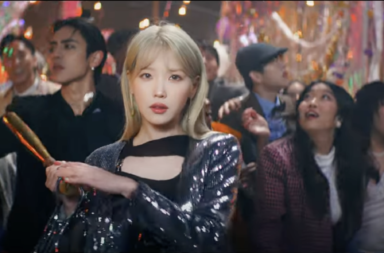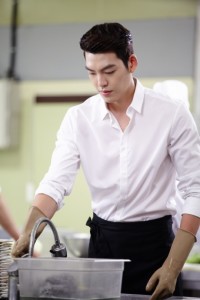 Dramas have many character archetypes but it seems none are more hotly contested than the ‘bad boy.’ Whether a bad boy with a good heart or a charismatic villain, drama fans can’t get enough of these ‘bad boy’ characters especially if they have tragic pasts. But tragic back stories shouldn’t condone the sometimes harmful actions of these characters. So why are these characters so popular when fans would hate to encounter someone like this in real life?
Dramas have many character archetypes but it seems none are more hotly contested than the ‘bad boy.’ Whether a bad boy with a good heart or a charismatic villain, drama fans can’t get enough of these ‘bad boy’ characters especially if they have tragic pasts. But tragic back stories shouldn’t condone the sometimes harmful actions of these characters. So why are these characters so popular when fans would hate to encounter someone like this in real life?
Inspired by recent discussion of Cheese in the Trap‘s enigmatic lead, Yoo Jung, Seoulbeats asks why some fans root for the ‘bad boy.’
Is it the actor that the fans love? Do fans have trouble separating the character from the actor? Or is it fun to root for the bad boy where real people cannot be harmed?
Lorenza: I have a soft spot for the anti-hero archetype: the cynic or misfit who finds themselves in a position where they have to save the day. Their journey’s are more interesting. The lives they live are almost always more interesting, more dramatic than normal life, even if they live in poverty. It’s why James Dean was so popular back in the day; he wasn’t perfect, he pulled off the broody vibes, and his tortured soul spoke to the audience. They also fulfill the teenage rebellion fantasy many people still have.
I think people love these characters because at some point we all wish we could do/say something awful without consequences. Like Jung in Cheese in the Trap, sometimes using people’s insecurities and selfishness against them is an appealing way to deal with people, but not exactly socially acceptable. And sometimes those who are harmed in the show are written unflatteringly, making it feel like they deserve it, even if they’re supposed to be the good guys.
On the point of separating actors from their characters, it’s hard to know exactly. There are some actors who are just so good at playing bad guys that it doesn’t matter whether or not the character is deplorable, the fact that said actor is playing them makes it better. And that’s exactly what fans are looking for from that actor. It doesn’t necessarily mean that they can’t separate the two; probably that they just prefer watching that actor as a psychopath.
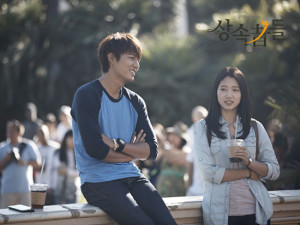 Laverne: Kim Woo-bin comes to mind for me as an actor who excels at playing the angsty, bad boy. Even in dramas in which I hated his character (Heirs, for example) I didn’t completely hate the character because it was Woo-bin playing him. Our love of actors definitely influences how we respond to a character.
Laverne: Kim Woo-bin comes to mind for me as an actor who excels at playing the angsty, bad boy. Even in dramas in which I hated his character (Heirs, for example) I didn’t completely hate the character because it was Woo-bin playing him. Our love of actors definitely influences how we respond to a character.
However, how far can we excuse a character’s actions? Continuing the example of Kim Woo-bin in Heirs, I wanted him to be happy but not at the expense of Park Shin-hye‘s character, which is where my dilemma as a viewer was created. I think there is an underlying ‘hope’ that causes many of us to root for the so-called bad boys. We genuinely see good in them and hope that they can overcome their adverse circumstances to be “better.”
It’s the same reason for why I’m so torn about Yoo Jung in Cheese in the Trap — every time I think he’s making progress, he does something else that washes away the hope I had for him. Which leaves me wondering whether I’m rooting for the character because of Park Hae-jin or because of an intrinsically optimistic view of human nature.
Gaya: See, with Heirs, I could at least appreciate that Kim Woo-bin’s character was the straight up bad boy; whereas the show tried to pass Lee Min-ho as a reformed bad boy through the power of love, but he was an even bigger entitled piece of shit. If the good guy is going to act like that, I’d much rather root for the bad guy because at least he doesn’t have that false veneer of respectibility that automatically comes with being portrayed as a ‘good’ character.
I feel like a lot of people see bad boys as the cold and distant types whose harsh exteriors eventually melt because they fall in love. People love them because the attention a bad boy gives you is special: he isn’t nice to everyone like Dream High‘s Jason (2PM‘s Wooyoung) leaving you to wonder whether he actually likes Pil-suk (IU) or not. If he pays any kind of attention to you, it means he considers you more worthy of his attention than other people, which in turn makes you think that you are better than other people — more special.
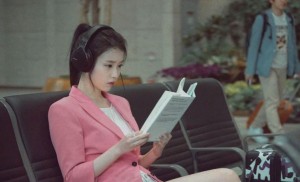 Of course, it shouldn’t be up to one guy to determine your own worth, but I can’t deny that it’s a nice feeling — even if said attention is coming from someone you consider to be a jerk, at first. I bet a part of Taylor Swift was pleased about Harry Styles‘ birthday tweet for this very reason. It’s also part of the appeal of dramas like Cheese in the Trap and Heartstrings and all the other dramas out there.
Of course, it shouldn’t be up to one guy to determine your own worth, but I can’t deny that it’s a nice feeling — even if said attention is coming from someone you consider to be a jerk, at first. I bet a part of Taylor Swift was pleased about Harry Styles‘ birthday tweet for this very reason. It’s also part of the appeal of dramas like Cheese in the Trap and Heartstrings and all the other dramas out there.
Personally, I am all about the villains (precisely because it is fun to support them in a fictional setting), and that is where my character-actor attachment becomes strongest. I became a fan of Park Ki-woong thanks to his antagonist role in Gaksital, and have ended up watching projects where he doesn’t play a bad boy. I think it’s harder for an actor playing a villain to capture the audience’s interest (rather than extended vitriol for the character), so when an actor manages to catch my interest, I hold on as tight as I can.
Hania: Audiences have always been drawn to dark and dangerous characters, as it allows us to indulge in a fantasy that has no real life implications. As no real people can be harmed, we enjoy seeing something different from what we know in our own lives.
As others have mentioned, we also love the bad boy character because we want to see them redeem themselves and prove everyone wrong, with our support. Rooting for the bad boy, then, comes from a place of wanting them to do well and being able to say “I told you so!” when his inner soft side reveals itself to the broader audience.
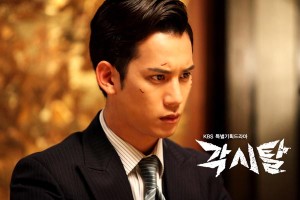 I also don’t think it’s a matter of audiences being unable to separate the actor from the character: in fact, we love seeing actors that can morph to any dark character that they have to, and this becomes their distinguishing trait.
I also don’t think it’s a matter of audiences being unable to separate the actor from the character: in fact, we love seeing actors that can morph to any dark character that they have to, and this becomes their distinguishing trait.
Essentially, villains are just a whole lot of fun, especially when they undergo a transformation within a drama or movie to become a better person that we, the audience, always knew they had the potential to be.
Madi: I agree with Hania on this one, a lot. Darker characters that make you think “what’s wrong with them/what happened to them that they turned out this way” are more interesting than the stereotypical “good guy” who “almost never gets the girl.” Good guys tend to be boring because most people can read them like a book. Hell, more people might relate to the bad boy because maybe his life situations are more relatable. Doesn’t mean that their way of thinking is right by any means. And some people root for the bad boy because their favorite actor/actress is playing them and will justifying their wrong doing cause “unnie/oppa wouldn’t really do that because she’s/he’s not really like that” — a stereotyprical reply of someone who tends to be in an abusive relationship.
Although it makes me laugh that a statement had to be issued on IU’s behalf because people thought that her playing Cindy in The Producers was how she is in real life. It’s called being a damn good actress. But it would interesting that more people would justify a male character’s attitude/wrong but call out a female actor when she’s playing a “chick with an attitude” character. Another topic for another day.
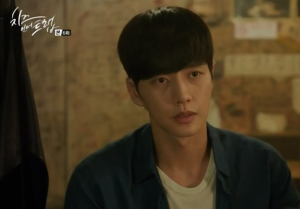 When it comes to Cheese in the Trap, Jung flops between showing displays caring about Seol, so there’s this sense of “he’s really not that bad” to being violent and bullying without a second thought. And people might even say what’s he’s doing for Seol is to make up how much he wronged her in the past so it’s in a sense to make things right. Yeah well, there’s a correct way to go about it and what he’s doing isn’t it. He’s making some sort of effort to change, but then he takes three steps towards to that change to only back pedal about a hundred.
When it comes to Cheese in the Trap, Jung flops between showing displays caring about Seol, so there’s this sense of “he’s really not that bad” to being violent and bullying without a second thought. And people might even say what’s he’s doing for Seol is to make up how much he wronged her in the past so it’s in a sense to make things right. Yeah well, there’s a correct way to go about it and what he’s doing isn’t it. He’s making some sort of effort to change, but then he takes three steps towards to that change to only back pedal about a hundred.
Lo: On the question of separating bad boys from their actors, I have to concede that I’ve never had the issue of equating characters and their actors. An actor’s job is to convince you they are this character, and if they happen to be really good at bad boys, it doesn’t mean anything but being really good at bad boys. I feel it’s like writers being really good at writing dialogue: this is what they do best, but it doesn’t reflect them as people.
As to the appeal of bad boys, that’s a more complicated question. While there us a great deal of truth in Hania and Madi’s arguments. Bad boys are typically written as more interesting than good boys: the damage they suffered and the kernels of good within them are a more interesting base then a nice guy. Of course, that’s not hard and fast; a good writer/actor can make the nicest guy interesting, and bad ones can make the most interesting character dull.
However, while many people like bad boys in dramas as a way to indulge in fantasies, even if they’d never put up with that shit in real life, I love bad boys because I love bad boys. My taste in partners is atrocious! In fiction and reality, I’m the kind of person who prefers blood rushing and sparks flying to sweet gestures and gentle romance, even if I can understand the appeal.
What about you, readers? Sound off in the comments below!

